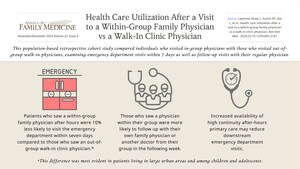ANN ARBOR, Mich., Jan. 12, 2023 /PRNewswire/ -- A new study published today in the Annals of Family Medicine presents results of a qualitative interview documenting experiences with digital surveillance of infectious disease (including COVID-19) in China. The study, "Primary Care Physicians' and Patients' Perspective on Equity and Health Security of Infectious Disease Digital Surveillance," can be accessed for free here.
Digital detection surveillance, a system comprised of a range of digital tools intended to provide benefits to healthcare providers and patients and prevent disease spread, was created in China in response to the COVID-19 pandemic.
The authors conducted in-depth interviews with 16 primary care physicians and 24 of their patients to explore perceptions and experiences of the digital detection system. The study was approved by the Institutional Review Board of the University of Hong Kong-Shenzhen Hospital in China. The interviewees reflected a range of ages, educational backgrounds, and clinical experiences from urban areas in northern and southern China.
Researchers identified five common concerns raised by primary care physicians and patients about the digital detection system:
- Ambiguity around the need for informed consent about the usage of digital detection surveillance
- The importance of autonomous decision-making
- The potential for discrimination of vulnerable users who may have an infectious disease who are surveilled by the digital detection system
- The risk of social inequity and divided care outcomes
- Authoritarian institutions' responsibility for maintaining health data security
Additionally, qualitative interview results also indicated that the adoption of digital detection surveillance would lead some patients to avoid the hospital for fear of either discrimination for their opinions or being forcibly quarantined. Respondents also largely believed that the elderly and young children were particularly vulnerable to the misuse of digital surveillance data.
As national and international health organizations look to establish ethical frameworks guiding the use of digital detection surveillance to reduce the spread of infectious diseases, the paper's authors argue that patient protections should be explicitly addressed.
Primary Care Physicians' and Patients' Perspective on Equity and Health Security of Infectious Disease Digital Surveillance, William Chi Wai Wong, Ivy Yan Zhao, Ye Xuan Ma, Wei Nan Dong, Jia Liu, Qin Pang, Xiao Qin Lu, Alex Molassiotis, Eleanor Holroyd.
SOURCE Annals of Family Medicine

WANT YOUR COMPANY'S NEWS FEATURED ON PRNEWSWIRE.COM?
Newsrooms &
Influencers
Digital Media
Outlets
Journalists
Opted In






Share this article